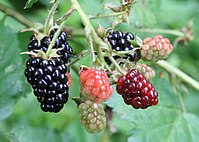
Photo from wikipedia
High temperature stress, which has been occurring more often in recent years, usually coincides with the flowering of primocane raspberries and causes a negative effect on fruit quality parameters. One… Click to show full abstract
High temperature stress, which has been occurring more often in recent years, usually coincides with the flowering of primocane raspberries and causes a negative effect on fruit quality parameters. One of the methods of delaying raspberry flowering and fruit development to avoid high summer temperatures is tipping the young primocanes. The aim of the study was to investigate how this practice affects the fruit characteristics and primary and secondary metabolites of two primocane raspberry cultivars (‘Amira’ and ‘Polka’). For this purpose, we performed primocane tipping on two different dates in late spring and analyzed the berries from three subsequent sampling dates. High performance liquid chromatography-mass spectrometry (HPLC-MS) analyses were used for the identification and quantification of individual phenolic compounds and HPLC analyses for individual sugars and organic acids. Primocane tipping had great influence on the beginning of the harvest season of both cultivars. The impact on fruit yield was insignificant. Sampling date had a greater influence on fruit metabolite contents than did different treatments, with cultivar ‘Polka’ showing a greater response to primocane tipping than cultivar 'Amira'. Based on primary and secondary metabolites, it is difficult to say which treatment provided the best results, since dissimilar patterns were shown at different sampling dates and between cultivars. With negligible differences in fruit quality, primocane tipping was shown to be a good cultivation practice for delaying the production season of raspberries.
Journal Title: Notulae Botanicae Horti Agrobotanici Cluj-napoca
Year Published: 2017
Link to full text (if available)
Share on Social Media: Sign Up to like & get
recommendations!